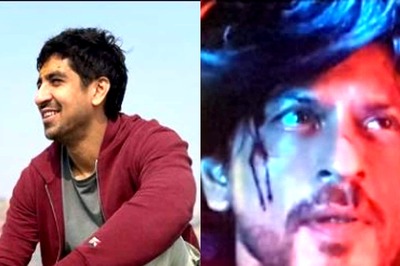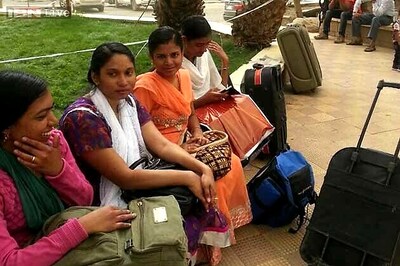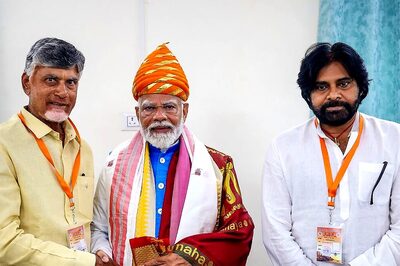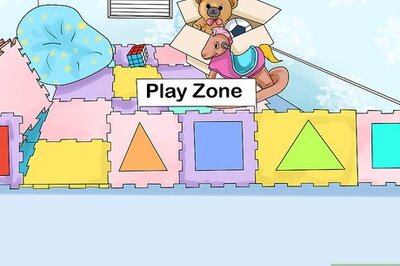
views
Srinagar: Streets in Srinagar are desolate as the city is in the middle of the fourth day of a government clampdown. Authorities have imposed section 144 of the Criminal Procedure Code (CrPC) – prohibiting the assembly of four or more people. The restrictions are sterner than a curfew.
Paramilitary troopers are fanning across Srinagar and the towns of Kashmir valley. Barricades of concertina wire manned by forces have been installed at the exit and entry points of all key streets and bridges.
The Valley has been under lockdown since the Narendra Modi government decided on Monday to strip Jammu and Kashmir of its special constitutional status and divide the state into two Union Territories.
On Sunday afternoon, Kashmir started preparations for “bad days”. As word spread that authorities were gearing up for curbs that could last months, residents rushed to markets to buy essentials in bulk.
The buildup began with an order saying the Centre was mobilising 100 companies of paramilitary troopers to the Valley. The move triggered rumours in Kashmir that the Modi government was planning “something big” in the region. The subsequent orders related to matters of security, including one asking tourists and Amarnath pilgrims to make a hasty retreat to their homes, added to the panic. It was followed by deployment of an additional 250 companies of paramilitary forces. Locals crowded at fuel stations to get their vehicles filled adequately.
On Sunday night, as feared, cellular and internet facilities were shut first, followed by suspension of all telecommunication services, including broadband and landline.
The next morning, Kashmir woke up to a curfew and, in the absence of internet, people glued themselves to their TV and radio sets to find out why this was happening. A few hours later, the speculation doing the rounds since July 25, was proven right. Home minister Amit Shah announced in Parliament that the state of Jammu and Kashmir had been reorganised into two Union Territories and the government had scrapped Article 370 of the Constitution.
Anticipating outrage from the region’s mainstream politicians, authorities detained the top leadership of the People's Democratic Party (PDP) and National Conference (NC), including former chief ministers Omar Abdullah and Mehbooba Mufti along with Sajjad Lone who also served as a minister in the previous PDP-BJP government in J&K. Both Abdullah and Mufti have been purportedly kept in detention at a guesthouse. PDP youth wing leader Waheed-ur-Rehman Parra has been kept at a government hotel after being slapped with the Public Safety Act (PSA). Officials, however, could not be reached for comment.
Separatists have not been able to issue a statement on the matter. Hurriyat leaders Mirwaiz Umar Farooq and Mohammad Ashraf Sehrai are also in detention.
On Saturday evening, state parties held a meet in Srinagar at NC patron Farooq Abdullah’s residence, urging the Centre to halt any plans vis-à-vis abrogation of the state’s special status.
"The region is in complete shock and everything has come into standstill. People are still not able to process what has really happened and everyone is afraid of the possible reaction and repercussions,” said Dr Mehraj ud Din, assistant professor at a local university.
Dr Mehraj is slated to attend an international conference in Malaysia but says his passport is stuck at the post office. “The common concern is, whatever was decided was done without taking into consideration the interests of the people of the Valley,” he said.
In Srinagar, street fights were witnessed in a few areas. Stone pelting took place in the city’s uptown Rambagh locality on Monday evening at the hour of change of deployment of government troopers. Witnesses said scores of youngsters came out on the roads and threw stones at security personnel who retaliated by chasing them away.
A teenager died when, according to locals, forces pursued a group of boys. One of them jumped into the river Jhelum to get away. He drowned.
The SMHS Hospital received a few injured youths who were hit with pellets during clashes with forces at various places in the city.
Amid the lockdown, Srinagar is also facing a municipal crisis with public garbage bins spilling and spots littered with waste. At many places, carcasses of dogs were strewn about as municipal workers were unable to move around due to restrictions.
Patients in need of emergency medical aid were finding it difficult to reach hospitals, as they strived to convince the troopers to let them through. Farooq Ahmad, a resident of Rajbagh area, said he took his ailing mother to a children's hospital located nearby for checkup “because going to SMHS was extremely difficult”. A medical assistant at this institute accepted that they were receiving patients suffering problems other than paediatrics.
Many complained that they were running out of stored essentials. People are facing a shortage of milk, fresh vegetables, baby food and medicines.
Due to the communication blockade and restriction of movement, rural Kashmir remains cut off from Srinagar. Not much is known about how villages have responded to the ‘big news’. Some are not aware at all, as newspaper delivery has become difficult.
The communication shutdown has added to the worries of families with members studying or working outside Kashmir. Haleema, a resident of Batmaloo in Srinagar, is concerned about the well-being of her daughter, who is studying engineering in Chandigarh. "We have no idea about her health. We don't know whether my daughter has money," she said.
Despite the internet shutdown, several newspapers are being published from Srinagar, including Greater Kashmir, Kashmir Reader, Kashmir Uzma and Tameel-i-Irshad. “Though it only has four pages, we made sure we print and circulate the paper in at least some parts of Srinagar," said Mohammad Raafi, a worker at Kashmir Reader. "We wrote our copies after collecting bits and pieces of information from TV.”




















Comments
0 comment